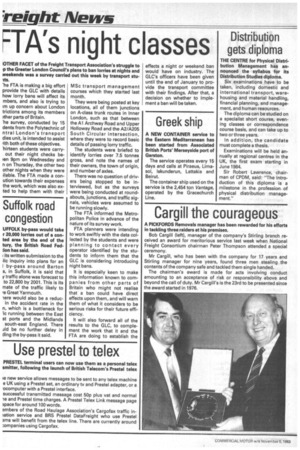Suffolk road congestion
Page 16

If you've noticed an error in this article please click here to report it so we can fix it.
UFFOLK by-pass would take r 20,000 lorries out of a conted area by the end of the Wry, the British Road Fed:ion has said.
its written submission to the lic inquiry into plans for an I by-pass around Barton s, in Suffolk, it is said that y traffic alone was forecast to to 22,800 by 2001. This is its mate of the traffic likely to re Great Yarmouth.
-iere would also be a reducin the accident rate in the n, which is a bottleneck for ic running between the East St ports and the Midlands south-east England. There _lid be no further delay in ding the by-pass it said.
MSc transport management courses which they started last month.
They were being posted at key locations, all of them junctions on A-class trunk routes in Inner London, such as that between the Al Archway Road and Upper Holloway Road and the A2/A205 South Circular intersection, where they were to record basic details of passing lorry traffic.
The students were briefed to identify lorries over 7.5 tonnes gross, and note the names of their owners, the town of origin, and number of axles.
There was no question of drivers being stopped to be interviewed, but as the surveys were being conducted at roundabouts, junctions, and traffic signals, vehicles were assumed to be running slowly.
The FTA informed the Metropolitan Police in advance of the nature of its survey work.
FTA planners were intending to work swiftly with the data collected by the students and were planning to contact every operator identified by the students to inform them that the GLC is considering introducing night bans.
It is especially keen to make this information known to companies from other parts of Britain who might not realise that a ban could have direct effects upon them, and will warn them of what it considers to be serious risks for their future efficiency.
It will also forward all of the results to the GLC, to complement the work that it and the FTA are doing to establish the effects a night or weekend ban would have on industry. The GLC's officers have been given until the end of January to provide the transport committee with their findings. After that, a decision on whether to implement a ban will be taken.




















































































































